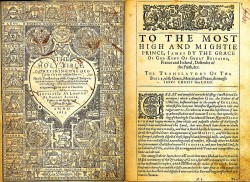Let us take a moment to celebrate, or perhaps curse, the memory of misheard lyrics, the finding of which is great fun, and is one of the great time-wasting joys of the internet. Mishearing “breaking rocks in the hot sun” as “a grape skin rots in the hot sun” in the Clash’s I fought the Law’s is a good one. But the serene phrase from Psalm 23, “Surely goodness and mercy shall follow me all the days of my life,” heard as “Surely good Mrs Murphy shall follow me all the days of my life,” is my long-time personal favourite.
 Iselers at the Distillery: The latter quote — the correct one, I mean — is from the King James Bible, a translation of various Christian and Hebrew scriptures, and was for centuries the central document through which these texts were disseminated in the English-speaking world. Truly beautiful though it is, it contains many inaccuracies and misreadings, particularly of Hebrew scripture, which have been corrected or re-translated by later scholars. But for those who grew up with the King James version, these reinterpretations often seem to lack richness and resonance. Never mind that any western translation of a several thousand year-old text from the Middle East is likely to miss the original point by a wide, almost unbridgeable inter-cultural gap; our fallible memories create orthodoxies that lead us to strongly resist the unfamiliar and new, especially when the old is so much more singable.
Iselers at the Distillery: The latter quote — the correct one, I mean — is from the King James Bible, a translation of various Christian and Hebrew scriptures, and was for centuries the central document through which these texts were disseminated in the English-speaking world. Truly beautiful though it is, it contains many inaccuracies and misreadings, particularly of Hebrew scripture, which have been corrected or re-translated by later scholars. But for those who grew up with the King James version, these reinterpretations often seem to lack richness and resonance. Never mind that any western translation of a several thousand year-old text from the Middle East is likely to miss the original point by a wide, almost unbridgeable inter-cultural gap; our fallible memories create orthodoxies that lead us to strongly resist the unfamiliar and new, especially when the old is so much more singable.
While one can challenge its accuracy, no one can deny the poetic majesty of the King James Bible, which has been a source of inspiration to many great composers. Various musical settings of King James-derived material can be enjoyed at a concert on 25 November by the Elmer Iseler Singers, titled “King James and Shakespeare.” (The birth of the King James Bible 400 years ago coincides with Shakespeare’s latter years.) The concert takes place in an unusual venue for the Iselers — the Young Centre for the Performing Arts in the Distillery District. Jazzmen Gene DiNovi and Dave Young guest and Soulpepper Theatre’s Albert Schulz narrates.
The Mendelssohn’s Brahms: Johannes Brahms was a composer with an acute sense of cultural memory. Conscious of his place in musical history, and highly respectful of his mentor Robert Schumann, he had a sense of responsibility towards understanding and furthering the musical traditions to which he was heir.
His famous feud with Wagner — or rather, the feud between fans and advocates of the two composers — centred around the question of memory. Wagner’s aesthetic demanded a sweeping away of the old, including old musical forms. Brahms felt that older forms could be imbued with new ideas.
Nowadays it is possible to hear elements of both innovation and musical tradition in Brahms. The Toronto Mendelssohn Choir presents an all-Brahms programme on November 9. The Alto Rhapsody and Deutsches Requiem are among Brahms’ greatest choral works, but the evening is notable for two lesser known works as well, Nänie and the Gesang der Parzen (Song of the Fates). Brahms’ choral works are imbued with his knowledge of baroque contrapuntal part-writing, and are consistently innovative in terms of timbres and techniques. They are notably more interesting than Wagner’s choral writing. Oops, was that my outside voice?
Incidentally, the Toronto Mendelssohn Choir is programming some intriguing choral read-throughs and conducting workshops in the weeks and months ahead. These are excellent resources for choral singers and conductors, and are well worth checking out. Go to the TMC’s website and look under “education and outreach.”
25th solstice: A choir’s own past can also be the occasion for celebration. On December 3, Jenny Crober’s East York Choir celebrates its 25th year of existence with “Winter Solstice,” a concert that includes a premiere of a work by veteran Canadian composer Stephen Hatfield. The EYC has always been open to folk and popular elements in choral music, and has consistently programmed works both substantive and entertaining.
And speaking of the solstice, the Christmas choral celebration, fast upon us, can be a particularly contentious arena. Often one hears the seasonal plea, in part a reaction to the commercialization of the holiday, to “keep Christ in Christmas.” And yet many of the most familiar tropes of Christmas — holly, trees, gifts, the midwinter date of the celebration — are borrowed and appropriated from pre-Christian pantheistic worship, popularly known as paganism.
One might reasonably argue that many of the apparently non-religious aspects of Christmas that are often deplored — the saturnalia of gift-giving, decoration, parties and indulgence in food and drink — have actually returned Christmas to its pre-Christian roots, a mid-winter solstice celebration of companionship and warmth in the midst of cold and darkness. Muse on this when next you hear the great carol, The Holly and the Ivy, redolent with pagan imagery.
The above is only one of many great carols, and one of the delights of this time of year is the chance to indulge in many concerts and hear the many and varied approaches to carols, songs and extended Christmas-themed works. I am told that a measure of eggnog can add to this delight, though this column takes no responsibility for the health or safety of those who over-indulge in either carols or festive drinks.
Finally, some upcoming seasonal concerts of note
The Kyiv Chamber Choir, on tour of Canada from the Ukraine, sings in Waterloo, St. Catherines and Toronto between November 25 and 27.
The Mohawk College Community Choir includes Saint-Saëns’ Christmas Oratorio in a concert on December 3.
On the same night, Cantores Celestes performs Canadian choral icon Derek Holman’s Sir Christemas in a concert that benefits, in part, the Assaulted Women’s Helpline.
 In Guelph on November 26, the Guelph Chamber Choir performs “Voices of Light: An Advent Festival of Music and Poetry,” including English-born Canadian Paul Halley’s Voices of Light and works by American choral composers Daniel Pinkham and Eric Whitacre.
In Guelph on November 26, the Guelph Chamber Choir performs “Voices of Light: An Advent Festival of Music and Poetry,” including English-born Canadian Paul Halley’s Voices of Light and works by American choral composers Daniel Pinkham and Eric Whitacre.
I am always advocating for Benjamin Britten’s St. Nicholas to evolve into a seasonal favourite on par with Messiah, Christmas Oratorio, etc. The Pax Christi Chorale performs this wonderful work on December 3 and 4.
Also on December 3, the Toronto Choral Society performs in a Scarborough Philharmonic Orchestra concert with the intriguing title of “Howard Cable’s Cowboy Christmas.” Composer Cable, a genuine Canadian institution, hosts and conducts.
For those who are not quite ready to embrace the winter choral season in all its frosty exuberance, Isabel Bernaus’ Jubilate Singers performs “Music of the Mediterranean” on November 26. A concert that focuses on music from warmer climes might be just the thing to feed the spirit as the cold weather descends and the autumn recedes into memory?
Ben Stein is a Toronto tenor and theorbist. He can be contacted at choralscene@thewholenote.com. Visit his website at http://benjaminstein.ca.



